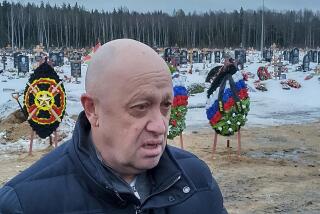New No. 2 Man in Russia Faces Uncertain Future
MOSCOW — Until Wednesday, he is busy saving Russia from communism. But what will Alexander I. Lebed--patriot, folk hero and indestructibly virtuous soldier--do next with the mighty political sword that Boris N. Yeltsin has put in his hand during an electoral battle for the Russian presidency?
Since the first round of voting June 16, Lebed has become the most powerful man in Russia after Yeltsin. Although the former general came in only third in that vote, Yeltsin conscripted him for the final campaign to beat the president’s Communist rival, Gennady A. Zyuganov, in the runoff Wednesday.
So honors have been heaped in Lebed’s lap. Yeltsin has given him the ill-defined but hugely influential job of Russian security chief. The president has sacrificed the top military and security men--Lebed’s rivals and personal enemies--who once had his ear. Lebed has been granted new powers to appoint the next army bosses and is now said to be lobbying for control of intelligence agencies. Yeltsin has even hinted that Lebed could be his choice as successor at the end of the decade.
As a preelection tactic, bringing Lebed under his banner has been Yeltsin’s masterstroke. Although fewer than half of Lebed’s nationalist supporters are expected to cast votes for the more pro-Western Yeltsin, the president’s overall ratings have soared as Communist resistance crumbles. The appointment may have secured the incumbent another term in office.
But it remains to be seen whether the 46-year-old onetime paratrooper will continue to be useful to the president after the election.
“I think there will be a lot of conflict. He’s coming into a job he doesn’t know, into an administration he doesn’t know . . . and he’s a cowboy,” said Michael McFaul of the Carnegie Endowment for International Peace.
Lebed himself clearly takes at face value the suggestion that, as an heir apparent, he could coast into the presidency in 2000. The former commander of the Soviet 14th Army in Moldova seems to want a chance to learn his way around the corridors of power and hone political skills that would set him up as Yeltsin’s inheritor.
Reveling in his new place in the Kremlin, Lebed is supremely confident that after Wednesday’s vote he will continue to be given free rein to impose his own program ending crime, corruption and the war in Chechnya.
“I have no fears, only a feeling of reality,” he told the Itar-Tass news agency Thursday. “A thief must be in prison, and a corrupt official must at the very least be removed from power.”
But the tasks Lebed has set for himself are so broad that they will inevitably cause clashes with Kremlin courtiers anxious not to lose their control over politics and the public purse. He has said his idea of national security encompasses “such things as our growing dependence on food imports, deteriorating inter-regional economic relations, capital flight from the country, privatization.”
It is Lebed’s plans to fight corruption that could bring him into conflict with Yeltsin. Time and again over the last five years, sleaze investigations have evidently been hushed up whenever they reached too close to Yeltsin’s entourage.
“You need very delicate instruments for solving this problem. You can’t do it with a sword,” said businessman Konstantin N. Borovoi, founder of Moscow’s commodities exchange. “One of the problems Lebed could face is that it will become clear to him that organized crime is connected closely to the president. . . . If he does his job right, he will create a lot of difficulties for the president and make a lot of enemies. He’s a very new person in the team, and they will eat him.”
Lebed’s political naivete may also drive a wedge between him and Yeltsin. He has spent the days since his appointment grappling publicly with issues of high politics that seem embarrassingly beyond his grasp, causing consternation among government officials and the president’s Western allies.
An imprudent prediction--of an economic crisis by the fall--earned him a rebuke from Prime Minister Viktor S. Chernomyrdin, who responded by publicly calling attention to the security chief’s inexperience.
On Thursday, Lebed railed against foreign religious groups, calling Mormon and other “nontraditional” denominations in Russia “scum” and “mold.” President Clinton raised objections to the remarks on Saturday.
Lebed’s views on ending Russia’s unpopular war in Chechnya have also changed over time, said Sergei N. Yushenkov, a liberal member of the Russian parliament’s defense committee: “First he said he didn’t approve of using military methods in Chechnya. Then he said Russian troops should either win or withdraw. Now he wants a referendum to let the Chechen people decide on whether to stay in Russia. Which alternative he will choose remains unclear.”
Lebed has blown hot and cold about expansion of the North Atlantic Treaty Organization into Eastern Europe. At times he is hostile to it, and at times he casually dismisses the whole issue by saying that NATO could not afford a move east anyway.
If Lebed runs afoul of other Kremlin players, he will have little protection. His new powers, granted by a stroke of the presidential pen, have no independent constitutional basis and could be taken away just as easily if Yeltsin, a consummate politician and in the past a fickle master, tires of him.
The vehicle of power Lebed is using--the Security Council, of which he has been named secretary--is a forum for Russia’s most powerful men to make decisions determining the fate of the country.
But in contrast to its Soviet predecessor, the Politburo, ultimate power in the council lies with the president, who must issue decrees to make its decisions come to pass. So Lebed remains directly dependent on Yeltsin.
“Lebed is apparently hoping to pull the real strings of power in Russia while Yeltsin officially occupies the throne, mostly indulging in tennis and vodka. But . . . Yeltsin has proven himself as the cleverest Byzantine-style statesman in Moscow. . . . Lebed may have been called to power only to take, eventually, all the blame for future Kremlin blunders,” said Pavel Felgengauer, political commentator for the daily Segodnya.
Some analysts suggest that personal chemistry will bind the men. Both are cast in the same hearty, no-nonsense, “real man” mold that warms Russian hearts. Yeltsin’s two autobiographies and Lebed’s recent “Ashamed for My Country” all feature episode after rollicking episode in which the hero-narrator takes on rogues and fools, puts them in their place and comes out on top.
The two have had similar careers, fighting back after bureaucracies seemed to have bested them. Yeltsin won the presidency of the Russian Federation after being thrown out of the Politburo in 1987, while Lebed surged back into power after then-Defense Minister Pavel S. Grachev got him fired as commander of the 14th Army in 1995.
Although Yeltsin and Lebed have both taken pains to stress that they are looking for long-term stability, their shared taste for trouble and conflict seems an unlikely basis for a lasting partnership. Touchy and prone to standing on his dignity, Lebed may find it hard to swallow the humiliations that are the courtier’s daily lot, said Alexei I. Pedberezkin, ideological strategist for Communist leader Zyuganov.
Yeltsin “will never accept treating another person as an equal. Whether Lebed can stand it or not, I don’t know,” he said. Echoing the thought, Lebed told the weekly Moscow News that he would offer his resignation if his honor was besmirched in any way.
After the electoral need to keep Lebed happy at all costs has passed, Yeltsin might well find the most practical way to contain his popular security chief will be to focus his attention on a task he is uniquely well-equipped to handle: army reform.
The 1.5-million-man armed forces have fallen on hard times since the collapse of the Soviet Union. And under Grachev, almost nothing was done to give them a post-Cold War identity or even to allow them to feed themselves adequately.
Lebed has made clear what his gradual reform program would consist of: streamlining the armed forces’ five branches into three, moving toward professional units rather than an unwieldy conscript force and dropping attempts to keep the military to its Soviet-era size.
“Lebed has influence of his own in the army and the support of other influential figures,” Felgengauer said. “On this issue, at least, Lebed’s views are mature and settled. At long last, Yeltsin has a person in high office who understands the problems of the military. Lebed’s appointment creates the possibility that the Russian army will reform, rather than just mutiny.”
More to Read
Sign up for Essential California
The most important California stories and recommendations in your inbox every morning.
You may occasionally receive promotional content from the Los Angeles Times.










